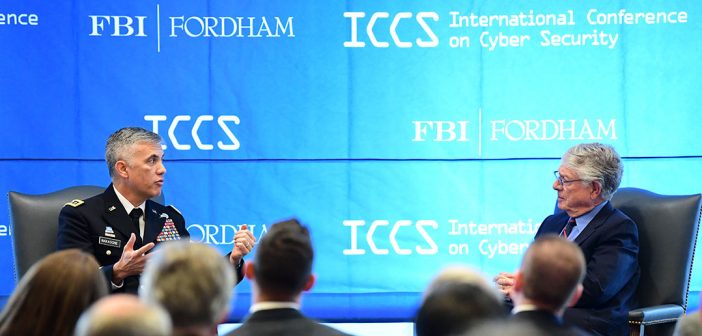U.S. Attorney General William P. Barr implored tech companies to make encrypted devices more accessible to law enforcement on the second day of the eighth International Conference on Cyber Security at Fordham’s Lincoln Center Campus.
The day ended with esteemed journalist Ted Koppel imploring the head of the National Security Agency to also open up about its role in cyberwarfare—to the American public.
“I don’t think the American public has a clue what our strategy is. I consider myself very well informed on this subject. I’m not sure I do either,” Koppel said to General Paul M. Nakasone, United States Army Commander, United States Cyber Command and Director of the National Security Agency/Chief, Central Security Service.
Koppel, who discussed the vulnerabilities of the nation’s power grids in a panel at the 2016 cybersecurity conference, sat with General Nakasone at Fordham’s Lincoln Center campus for what was billed as a “fireside conversation.”
Their hour-long chat touched on everything from the NSA’s establishment of a cybersecurity directorate, which the general said would make it easier for the agency to assist other agencies, such as Homeland Security, to the countries’ readiness for the 2020 elections.
Nakasone said that with regards to cyberwarfare, the posture of the United States is one of “defend forward,” which he said meant that the U.S. will not hesitate to act first on behalf of itself or its partners to disrupt actions it sees as potentially destructive.
Unfortunately, he said, success in this area is often defined not by what the American public can see, but rather what it doesn’t. ISIS, and its allies, for instance, no longer dominate the news cycle with gruesome videos of beheadings, he said.
The lessons of the 2016 elections have also been absorbed by the intelligence community as well, he said.
“Our adversaries are learning that we are no longer in a pattern of just waiting for it, and wondering if the United States is going to [respond],” he said.
Koppel repeatedly challenged Nakasone, asking him, for instance, how long it might take for the N.S.A. to identify the nationalities of people involved in a cyber-attack if it took place in Uruguay, or even Queens.
He also asked if Nakasone considered “thousands of individual self-appointed journalists on the internet who are putting out a lot of nonsense,” to be a security problem worth including in an overarching strategy.
“I have the responsibility both as a commander and the director of an agency to be up front, to be transparent, and to answer the questions from my overseers and from the media to the best of my ability. I think the American public expects that out of leaders in our government, and I think that’s what I have to focus on, Nakasone said.
Ultimately, he was cautiously optimistic about the country’s cybersecurity.
“Our capabilities are greater than our vulnerabilities, and the work we’ve done has mitigated some of those vulnerabilities,” he said.



